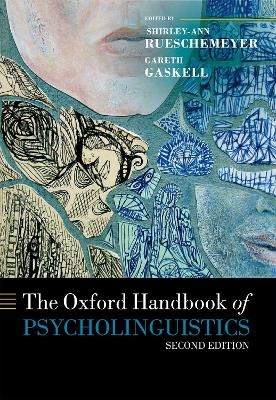
The Oxford Handbook of Psycholinguistics
Oxford University Press (Verlag)
978-0-19-878682-5 (ISBN)
This new and expanded edition of The Oxford Handbook of Psycholinguistics brings together the views of over 80 experts in various domains of psycholinguistic research, offering a comprehensive and authoritative review of the field. With contributions from the fields of psychology, linguistics, cognitive neuroscience, attention, genetics, development, and neuropsychology divided into five themed sections, this new edition of The Oxford Handbook of Psycholinguistics is unparalleled in its breadth of coverage.
The comprehensive nature of this book coupled with the accessibility of the short chapter format makes this handbook essential reading for students and researchers in the fields of psychology, linguistics and neuroscience.
Shirley-Ann Rueschemeyer is an Associate Professor in Psychology at the University of York, UK. She received her first degree from the University of Regensburg in Germany. She completed her PhD at the Max Planck Institute for Human Cognitive and Brain Sciences, Leipzig, Germany, and spent several years as a research fellow at the Donders Centre for Cognition in Nijmegen, NL. Her research has focused on understanding the role of the social world in language comprehension, the neural correlates of language comprehension, and bilingual language comprehension. M. Gareth Gaskell is a Professor of Psychology at the University of York, UK. He received his first degree from Cambridge University, UK and was awarded a PhD from Birkbeck College, University of London, UK. Professor Gaskell has strong interests in both psycholinguistics and memory, with a particular focus on the interface between the two. He has developed a model of spoken-word recognition, and has studied written and spoken language perception and production across a wide range of languages. More recently he has explored the involvement of sleep in the process of learning and consolidating linguistic knowledge in adults and children.
Part One: Language Comprehension
Section One: Sublexical and Lexical Level
1: Laurence White: Segmentation of speech
2: Michael S. Vitevitch, Cynthia S.Q. Siew, and Nichol Castro: Spoken word recognition
3: Kathleen Rastle: Visual word recognition
4: Lotte Meteyard and Gabriella Vigliocco: Lexico-semantics
5: Jennifer Rodd: Lexical Ambiguity
6: Ton Dijkstra and Walter JB van Heuven: Visual word recognition in multilinguals
7: Elizabeth Jefferies and Hannah Thompson: Varieties of Semantic Deficit: Single Word Comprehension
Section Two: Sentence and Discourse Level
8: Maryellen C. MacDonald and Yaling Hsiao: Sentence comprehension
9: Evelyn C. Ferstl: Text Comprehension
10: Arturo E. Hernandez, Eva M. Fernandez, and Noemí Aznar-Besé: Bilingual sentence processing
11: David Caplan: Sentence level aphasia
12: David P. Corina and Laurel A. Lawyer: Language in Deaf Populations: Signed Language and Orthographic Processing
Part Two: Language Production
Section One: Sublexical Level
13: Grant Walker and Gregory Hickok: Speech Production: Integrating Psycholinguistic, Neuroscience, and Motor Control Perspectives
14: Carolyn McGettigan and Pascale Tremblay: Links between Perception and Production: Examining the roles of motor and premotor cortices in understanding speech
Section Two: Lexical Level
15: Linda R. Wheeldon and Agnieszka E. Konopka: Spoken word production: Representation, Retrieval and Integration
16: Laurel Brehm and Matthew Goldrick: Connectionist Principles in Theories of Speech Production
17: Brenda Rapp and Markus F. Damian: From Thought to Action: Producing Written Language
18: Victor S. Ferreira, Adam Morgan, and L. Robert Slevc: Grammatical Encoding
Section Three: Sentence and Discourse Level
19: Francesca M. Branzi, Marco Calabria, and Albert Costa: Cross-linguistic/bilingual language production
20: Peter Indefrey: The relationship between syntactic production and comprehension
21: Myrna F. Schwartz: Word production and related processes: evidence from aphasia
22: Andriy Myachykov, Mikhail Pokhoday, and Russell Tomlin: Attention and Structural Choice in Sentence Production
Part Three: Interaction and Communication
Section One:
23: Sarah Brown-Schmidt and Daphna Heller: Perspective-Taking During Conversation
24: Simon Garrod, Alessia Tosi, and Martin J. Pickering: Alignment during Interaction
25: Asli Özyürek: Role of Gesture in Language Processing: Towards a Unified Account for Production and Comprehension
26: Alan Garnham: Pragmatics and Inference
27: Ira Noveck: Experimental Pragmatics
28: Jos J. A. van Berkum: Language Comprehension, Emotion and Sociality: aren't we missing something?
Part Four: Language Development and Evolution
Section One: Ontogenetic Development
29: Katherine Demuth: Development of Prosodic Phonology
30: Lucia Sweeney and Rebecca Gomez: How Well Does Statistical Learning Address The Challenges of Real World Language Learning?
31: Marilyn May Vihman: First Word Learning
32: Susan A. Gelman and Steven O. Roberts: Language and conceptual development
33: Julia Udden and Claudia Männel: Artifical Grammar Learning and its Neurobiology in Relation to Language Processing and Development
34: Marianna E. Hayiou-Thomas, Julia M. Carroll, and Margaret J. Snowling: Developmental Dyslexia
35: Cristina McKean, James Law, Angela Morgan, and Sheena Reilly: Developmental Language Disorder
Section Two: Phylogenetic Development
36: Bart de Boer and Tessa Verhoef: Evolution of Speech
37: Paolo Devanna, Dan Dediu, and Sonja C. Vernes: The Genetics of Language: from Complex Genes to Complex Communication
38: Cathleen O'Grady and Kenny Smith: Models of Language Evolution
Part Five: Methodological Advances in Psycholinguistic Research
Section One:
39: Dale J. Barr: Generalizing over encounters: statistical and theoretical considerations
40: Thomas P. Urbach and Marta Kutas: Cognitive Electrophysiology of Language
41: Olaf Hauk: Source estimation, connectivity and pattern analysis of EEG/MEG data in psycholinguistics
42: Roel M. Willems and Marcel A. J. van Gerven: New fMRI methods for the study of language
43: Adeen Flinker, Vitoria Piai, and Robert T. Knight: Intracranial electrophysiology in language research
| Erscheinungsdatum | 05.09.2018 |
|---|---|
| Reihe/Serie | Oxford Library of Psychology |
| Verlagsort | Oxford |
| Sprache | englisch |
| Maße | 171 x 246 mm |
| Gewicht | 2196 g |
| Themenwelt | Geisteswissenschaften ► Psychologie ► Test in der Psychologie |
| Geisteswissenschaften ► Sprach- / Literaturwissenschaft ► Sprachwissenschaft | |
| Naturwissenschaften ► Biologie ► Humanbiologie | |
| Naturwissenschaften ► Biologie ► Zoologie | |
| ISBN-10 | 0-19-878682-4 / 0198786824 |
| ISBN-13 | 978-0-19-878682-5 / 9780198786825 |
| Zustand | Neuware |
| Haben Sie eine Frage zum Produkt? |
aus dem Bereich


